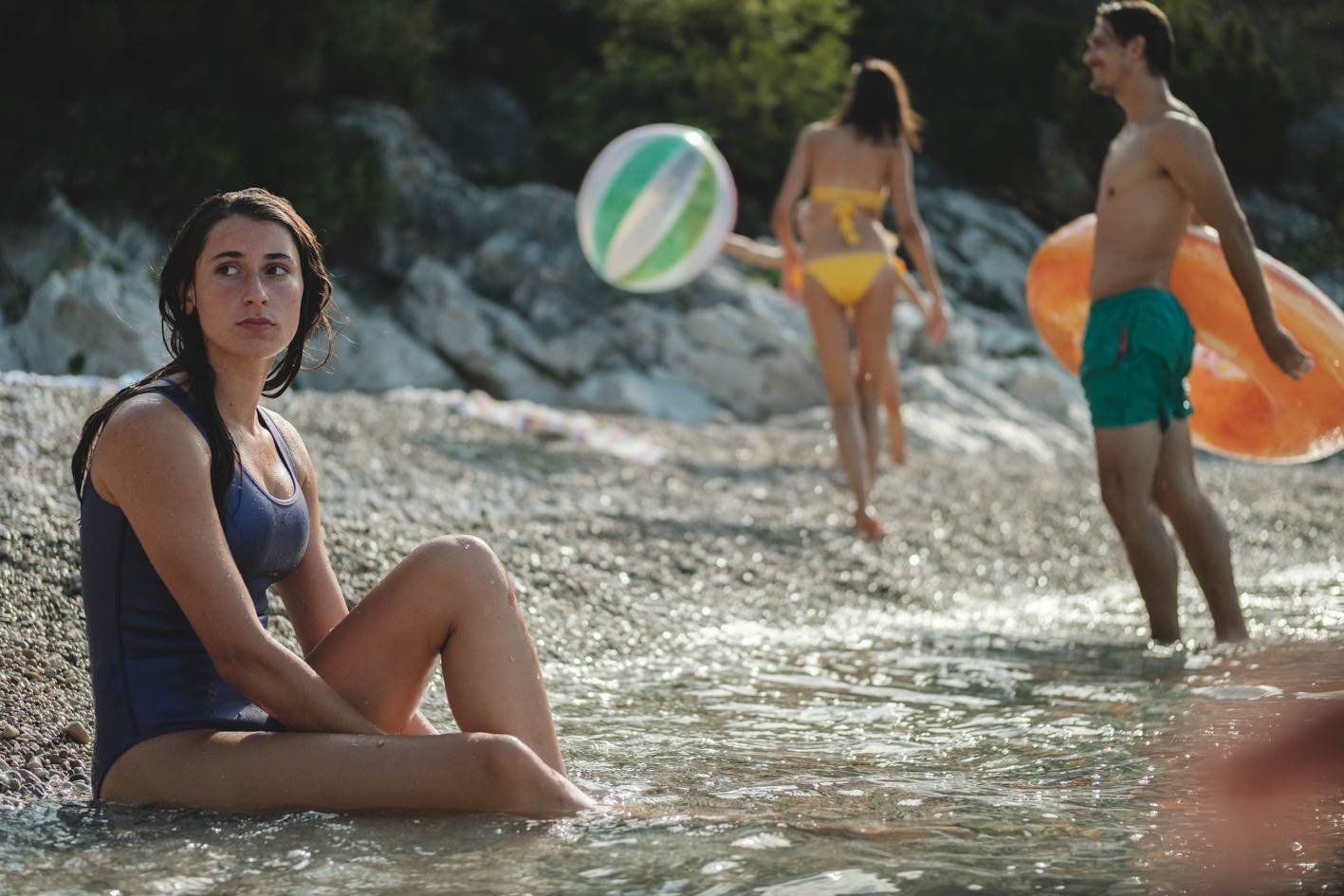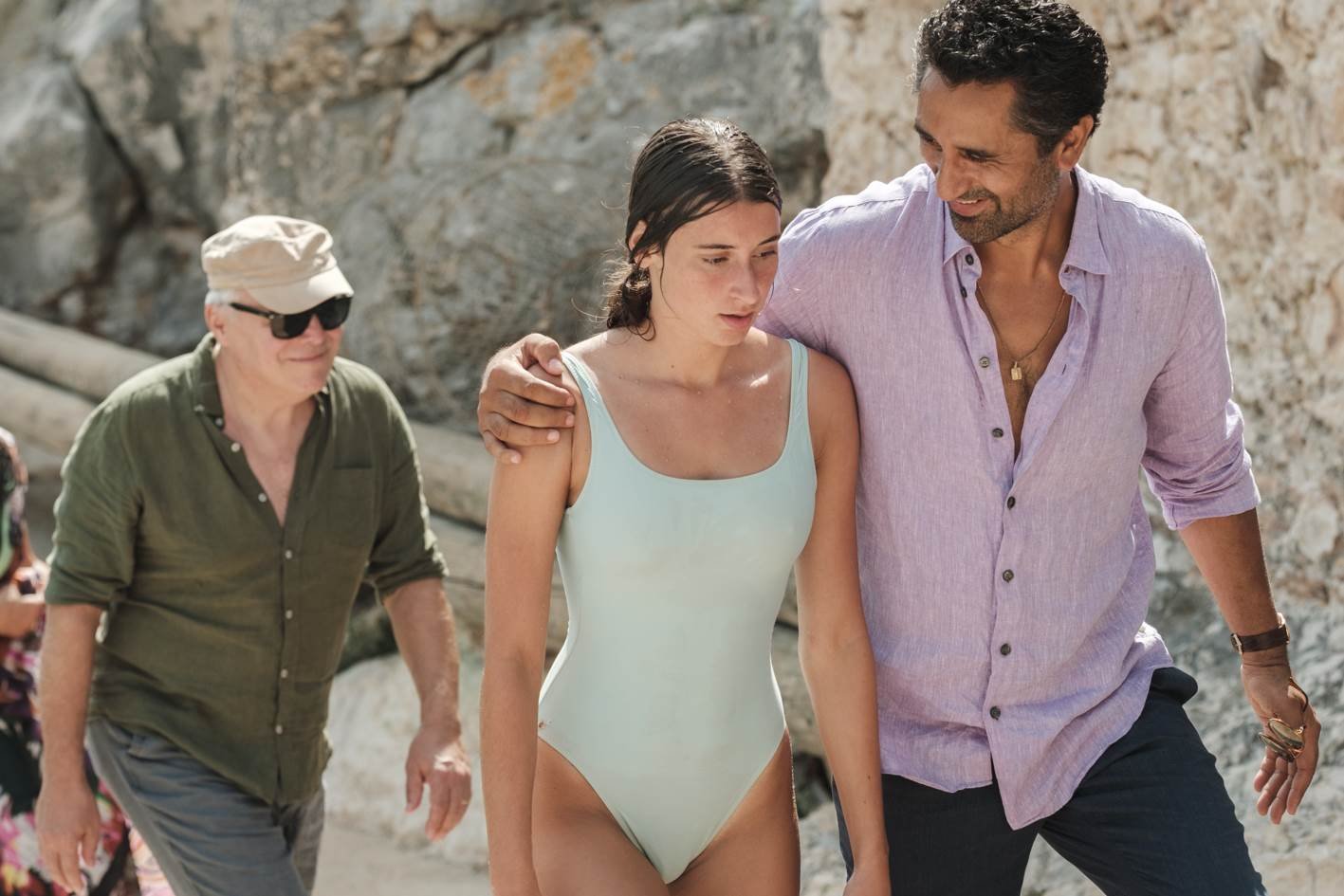Murina
The Glasgow Film Festival ends with a gala screening of Antoneta Alamat Kusijanović’s debut film, a searing summer drama that centres on the disintegration of a Croatian family after they are visited by an old friend.
It should be paradise; a simple, sun-kissed existence on the picturesque Croatian coast, hair permanently damp from swimming in the Adriatic Sea. Though she is able to spend most of her time swimming, diving, and spearfishing, Julija (Gracija Filipović) uses these aquatic activities as a way to escape from the dysfunctional home life that she shares with her domineering father, Ante (Leon Lucev), and her loving but passive mother, Nela (Danica Curcic).
Ante has invited Javier (Cliff Curtis), a wealthy foreign businessman and old friend, to stay at the family home for a long weekend, with a plan to woo him into buying a plot of land that the family own on an idyllic Croatian island, meaning he can use the proceeds to buy an apartment in the country’s capital, Zagreb. As the red carpet is rolled out for Javier’s arrival, Ante expects Julija to obediently fall in line and take her place in the background of the rigorously planned itinerary for the weekend. She is an accessory who must only speak when spoken to; a trained animal who must recite the poem that Ante has carefully selected to serve as after-dinner entertainment on Javier’s first night at their home.
As the family spend time with Javier, Julija’s infatuation for him grows. She develops something between romantic lust and adoptive desire for a man who is so starkly different to her own autocratic father, knowing that Javier has the ability to offer her some kind of escape; that he can open doors that offer an alternative to life under Ante’s roof. As Murina moves towards a conclusion that dives further into the depths of the family’s dysfunction, Julija’s sense of imprisonment increases, edging beyond being purely metaphorical.
Murina – from director Antoneta Alamat Kusijanović – won the Camera d’Or at last year’s Festival de Cannes, an award that is presented for the best directorial debut in one of the festival’s selection strands, and the Croatian’s first feature displays the kind of mature control that defies the fact that this is the work of a first-time director. From a tight script co-written by Kusijanović and Frank Graziano, Murina allows each character’s emotions to build and fester without ever quite bubbling to the surface, keeping the tension simmering under the surface with a permanent sense of unease. Kusijanović’s direction and script make the sea a character in itself; a place where Julija feels most comfortable yet where some of the film’s central drama takes place. The blues that are present throughout the film – everything from Julija’s mindset to her swimsuits – are perfectly framed by Hélène Louvart’s cinematography, which swaps the often-favoured oversaturated colouring for a lush, hazy blue that engulfs every shot of the film.
Kusijanović’s script gives room for the four central actors to develop and portray their own backstory and chemistry amidst the subtle drama that builds throughout the film. Filipović’s performance as Julija perfectly captures the sensation of struggling for your place in the adult world; that jarring feeling of approaching adulthood but not yet allowed to live with the independence that would allow you to flourish as you exit adolescence. While she dominates the film’s screen time, Julija does not have as many lines as you may expect – a result of her father’s desire to keep her on the periphery of the adult conversations he has with Javier and his wife – but Filipović’s presence is always felt; her distant stare and shrugged body language demonstrating Julija’s exasperation. Filipović - a guest at the GFF closing gala who discussed the film after the screening - explained that she even kept a diary as Julija to enter the mind of her character. Her relationship with her mother, Nela (Curcic), feels particularly fleshed out; they often appear like teenage friends - rather than mother and child - helping each other get dressed before dinner, gossiping and exploring Julija’s fairly inappropriate feelings towards how their future could pan out with Javier. Lucev’s performance as Ante, Julija’s father, is played with an almost comical temper, until you realise that it probably personifies a lot of the fathers of this generation, hardened by their experiences living during the Balkan Wars and the Croat War of independence.
Julija and Javier
Cliff Curtis (Blow, Training Day) as Javier arrives on the Croatian coast with the air of someone from another world; rich, successful, and from outside of the oppression of life in Julija’s household. All of the family gaze lovingly at him, knowing that winning his affection can offer each of them a different kind of escape; financial, romantic, or a different kind of parental guidance. As Murina unfolds, Julija realises that his surface level perfection may be insincere and he may be the worst of all; a fraud who is dishonest and leads people on without the ability to realise when he is doing more damage than good.
Murina is a lustful, understated drama that transports you to a picturesque setting from the holiday of your dreams, but doesn’t let you relax while the tension from the family’s weekend with Javier begins to suffocate them. Julija may live in the bliss of golden sand and crystal-clear water – but something murky exists beneath the surface, even in paradise.





